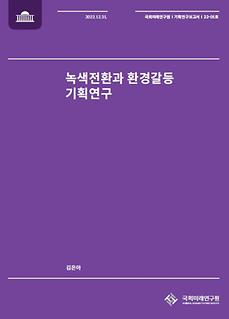
This study endeavors to diagnose the trajectory and performance of South Korea’s green transition in comparison to those of other developed nations, and to propose scenarios for resolving the environmental conflicts that impede this transition process. The concept of green transition is defined, and a set of “green transition indicators” are derived from the OECD’s green growth indicator system, with suggestions for enhancing the indicator system. Utilizing these indicators, the status and direction of green transition in several key countries were analyzed. Despite the increase in natural and environmental productivity brought about by South Korea’s high economic growth rate, the country’s overall green transition performance is found to be negatively impacted by rapid warming and deteriorating air quality. Environmental conflicts that arise during the green transition process are classified into three categories: conflicts in regulatory policy transition, location conflicts, and international conflicts, with the characteristics of each type summarized. Four scenarios for resolving these conflicts are presented, based on the presence of relevant international/ domestic policies, the availability of conflict resolution methods other than negotiation, and the possibility of written agreements through negotiation. This study also proposes an integrative conceptual model linking green transition and environmental conflict resolution scenarios, as a foundation for devising a strategy to improve South Korea’s green transition performance. Finally, future research topics were discovered, and a mid-to-long-term research framework is suggested based on the findings of this study.